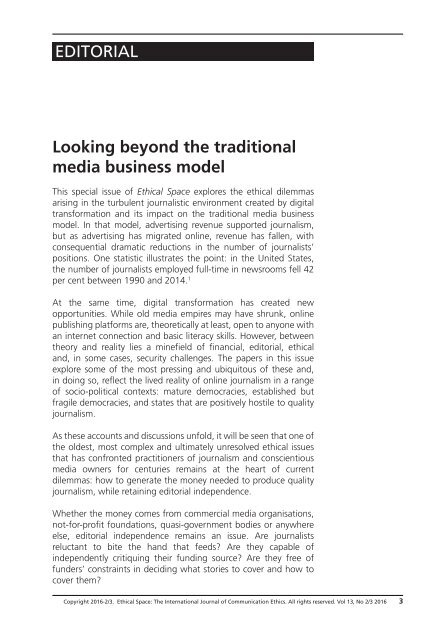Beyond clickbait and commerce
v13n2-3
v13n2-3
Create successful ePaper yourself
Turn your PDF publications into a flip-book with our unique Google optimized e-Paper software.
EDITORIAL<br />
Looking beyond the traditional<br />
media business model<br />
This special issue of Ethical Space explores the ethical dilemmas<br />
arising in the turbulent journalistic environment created by digital<br />
transformation <strong>and</strong> its impact on the traditional media business<br />
model. In that model, advertising revenue supported journalism,<br />
but as advertising has migrated online, revenue has fallen, with<br />
consequential dramatic reductions in the number of journalists’<br />
positions. One statistic illustrates the point: in the United States,<br />
the number of journalists employed full-time in newsrooms fell 42<br />
per cent between 1990 <strong>and</strong> 2014. 1<br />
At the same time, digital transformation has created new<br />
opportunities. While old media empires may have shrunk, online<br />
publishing platforms are, theoretically at least, open to anyone with<br />
an internet connection <strong>and</strong> basic literacy skills. However, between<br />
theory <strong>and</strong> reality lies a minefield of financial, editorial, ethical<br />
<strong>and</strong>, in some cases, security challenges. The papers in this issue<br />
explore some of the most pressing <strong>and</strong> ubiquitous of these <strong>and</strong>,<br />
in doing so, reflect the lived reality of online journalism in a range<br />
of socio-political contexts: mature democracies, established but<br />
fragile democracies, <strong>and</strong> states that are positively hostile to quality<br />
journalism.<br />
As these accounts <strong>and</strong> discussions unfold, it will be seen that one of<br />
the oldest, most complex <strong>and</strong> ultimately unresolved ethical issues<br />
that has confronted practitioners of journalism <strong>and</strong> conscientious<br />
media owners for centuries remains at the heart of current<br />
dilemmas: how to generate the money needed to produce quality<br />
journalism, while retaining editorial independence.<br />
Whether the money comes from commercial media organisations,<br />
not-for-profit foundations, quasi-government bodies or anywhere<br />
else, editorial independence remains an issue. Are journalists<br />
reluctant to bite the h<strong>and</strong> that feeds? Are they capable of<br />
independently critiquing their funding source? Are they free of<br />
funders’ constraints in deciding what stories to cover <strong>and</strong> how to<br />
cover them?<br />
Copyright 2016-2/3. Ethical Space: The International Journal of Communication Ethics. All rights reserved. Vol 13, No 2/3 2016 3


